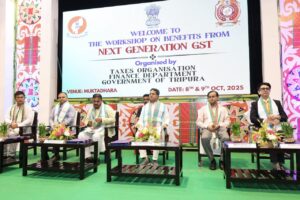Tripura CM Dr. Manik Saha said the new GST reforms are strengthening India’s economy and improving citizens’ lives, simplifying tax structures, reducing corruption, and making essential goods, healthcare, and agriculture more affordable under the “Viksit Bharat 2047” vision.
Chief Minister Dr. Manik Saha on Wednesday said that the new reforms under the Goods and Services Tax (GST) system have opened a new chapter in the nation’s economic transformation, enhancing both growth and welfare. Speaking at a workshop titled “Benefits from Next Generation GST” at Muktadhara Auditorium in Agartala, Dr. Saha emphasized that the reforms are strengthening India’s economic foundation while improving the quality of life for common citizens.
Highlighting the transformative impact of GST, the Chief Minister said, “The economic condition of both the country and the state is becoming stronger through the GST system. Revenue collection has also improved significantly due to these reforms.”
Dr. Saha noted that after India’s independence, Prime Minister Narendra Modi successfully implemented the long-anticipated concept of “One Nation, One Tax”, a move that unified the complex web of taxes into a single transparent system. “Earlier, citizens and businesses had to deal with a range of taxes such as Excise Duty, Customs Duty, Service Tax, Value Added Tax, Central State Tax, Luxury Tax, and Entertainment Tax. The Prime Minister provided a clear vision by replacing all these with GST, paving the way for accelerated national development. Because of this reform, India’s economy has progressed from the 11th position globally to the 4th,” he said.
Dr. Saha underscored that the present goal is to achieve Viksit Bharat 2047—a vision of a developed India by the country’s centenary of independence. “A detailed roadmap has already been prepared for Viksit Bharat 2047. Earlier, there were five stages in the GST structure, but it has now been simplified to two major slabs — 5% and 18%. This simplification benefits common people directly, as they can save nearly 4% on their monthly household expenses,” the Chief Minister added.
He explained that the introduction of GST has also reduced corruption and inefficiency in the transportation sector. “Previously, goods vehicles had to stop at several toll or naka points along national highways, which caused delays and opportunities for corruption. Now, these nakas have been removed, allowing trucks to reach their destinations 33% faster. This has resulted in substantial savings in fuel and time, thereby improving logistics efficiency and economic productivity,” Dr. Saha said.

The Chief Minister also highlighted that the GST reform has significantly boosted government revenue collection, enabling greater investment in public welfare programs. He said the system has not only strengthened the economy but also ensured that its benefits reach the poorest sections of society.
Providing a detailed breakdown of the revised tax structure, Dr. Saha announced that essential items such as milk, chickpeas, and bread have been made completely tax-free. “Daily-use goods like soap, shampoo, toothpaste, and bicycles are now taxed at just 5%. Similarly, products including salt, sauce, pasta, noodles, chocolate, butter, and ghee, which earlier carried taxes of 12% or 18%, are now brought down to 5%. This has brought major relief to middle-class and lower-income households,” he said.
The Chief Minister further mentioned that both life insurance and health insurance have been made GST-free under the new reforms. Life-saving medicines, diagnostic kits, and medical equipment are now taxed at either zero or 5%, making healthcare more affordable. Additionally, farmers stand to benefit, as tractors and rice harvesters now attract only 5% GST.
In a move that will also help the construction sector, Dr. Saha stated that the tax on cement has been reduced from 28% to 18%, making housing and infrastructure projects more affordable. “These measures collectively demonstrate that the new GST system is not only pro-development but also people-centric. It reflects our government’s commitment to economic empowerment and citizen welfare,” he added.
| Also Read: SIR begins in Khowai District to revise Voter Rolls for 2025 Elections |
The workshop was also attended by Finance Minister Pranajit Singha Roy, Finance Secretary Apurba Roy, and several senior officials. They discussed how the new GST structure will simplify compliance, reduce the burden on small businesses, and enhance state-level revenue generation.
With these reforms, Tripura is aligning its fiscal policies with the national vision of “Viksit Bharat 2047”, ensuring that the benefits of growth and development reach every section of society.







